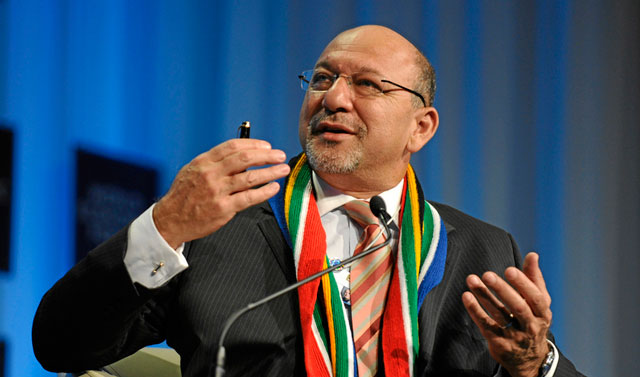
The Eskom board failed patently in its duties by reinstating Brian Molefe as CEO, former finance minister Trevor Manuel has argued.
Addressing delegates at the Ethics Institute’s 7th Annual Conference, Manuel pulled no punches in questioning the conduct of the Eskom board, the pension fund, the minister of public enterprises Lynne Brown and Molefe himself regarding the matter.
After he was implicated in the public protector’s “State Capture” report, Molefe voluntarily stepped down as Eskom CEO in November 2016, arguing that it was in the interest of good governance.
Brown previously blocked a R30m pension payout to Molefe and instructed the Eskom board to come up with an appropriate pension proposal, but in an about-turn on Friday she announced that Molefe would return to head up the power utility as the pension payout would not be in the best interest of the fiscus.
Manuel said the Eskom Conversion Act, a piece of legislation passed in 2002, set a number of tasks in law. Among those were that the board was “responsible for providing strategic direction and leadership, ensuring good corporate governance and ethics, determining policy [and] agreeing on performance criteria”.
Nowhere did any other piece of legislation governing corporations — not even the Companies Act — go into the same level of detail about leadership and ethics. The board, headed by chairman Ben Ngubane, was also the accounting officer in law, he said.
“When the board fails as patently as it does in this instance, who then takes responsibility?”
He said the board almost certainly had a committee that dealt with social, environmental and ethical issues. In terms of the King IV code on corporate governance, the committee had the final responsibilities in law. “Where is the committee?”
Referring to the previously proposed pension payout of R30m, Manuel said all pension funds were governed by the rules of the fund and established in terms of legislation. In each case, the value of a pension was determined by the rules and generally complied with either a defined benefit or defined contribution system. The rules also ensured that each member of the fund had an equi-determined entitlement to the share of the fund.
“Depending on your contribution, which is matched by the employer’s contribution, you can then determine before you leave what your entitlement is.”
Manuel said even if Molefe’s term as Eskom CEO was generously stretched to 20 months to account for the fact that he only officially left on 1 January 2017, there was “absolutely no way” that the combination of his contribution, the employer contribution and the growth in the fund could have produced R30m.
One had to ask whether, by applying the same rules, Eskom could set a pension payout for longstanding workers, who might have contributed to the fund for their entire working life, by a similar multiple of earnings. The oversight vested with the Eskom pension fund and the law was clear: the pension fund had to be made up of employer and worker representatives in equal numbers.
“Where is the pension fund in overseeing the way in which determinations are set?”
Manuel said Molefe took an oath when he was sworn in as an MP to obey, respect and uphold the constitution and all other laws of the republic. The same constitution Molefe swore allegiance to created chapter 9 institutions including the public protector, Manuel said.
Former public protector Thuli Madonsela, in her “State Capture” report, called for a judicial commission of inquiry into the allegations.
“If he respects and upholds the constitution, why does he undermine the recommendations from its public protector? These are fundamentally important questions.”
Manuel said he shared a platform with Brown during the World Economic Forum on Africa in Durban on 4 May and, like him, she supported the recommendation of the public protector that a judicial commission into state capture should be established.
“I can’t understand what happened between that public commitment made on 4 May and her agreeing to the reappointment of Brian Molefe and declaring his innocence on [12] May. What happened in a week?”
Manuel said the conduct of people appointed to lead institutions such as Eskom spoke to the nature of the ethical challenges facing South Africa.
He said he knew Molefe, Brown and Ngubane for a long time and when he looked at their conduct in relation to the matter, he was compelled to ask the “Psych 101” question: were the individuals natured or nurtured to conduct themselves outside the norms, morals and ethics of society?
“What happened? What went wrong in their brains? Why do they not see that they act outside of these things? Were they born this way or did something happen? In the case of Lynne Brown, certainly between 4 May and 11 May, what happened? What nurturing happened that compelled her to act in the way that she did and why did she not notice that she was doing something wrong?”
- This article was originally published on Moneyweb and is used here with permission




